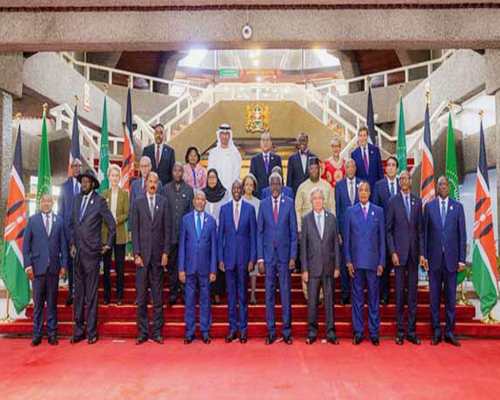California’s OAKLAND – Following the recent Africa Climate Summit, which took place in Nairobi from September 4–6, 2023, the world’s focus has been focused on the urgent issues that the African continent is facing as it copes with the catastrophic repercussions of climate change.
Africa, which accounts for less than 4% of global emissions, is due a significant climate debt by past polluters, but has only gotten 12% of the US$300 billion in yearly funding it needs to address climate-related concerns.
The Nairobi Declaration, which outlines the unified stance of African nations as they get ready for the upcoming COP28 climate change conference, was adopted at the end of the three-day summit. The declaration calls for “a new financing architecture that is responsive to Africa’s needs,” including debt restructuring and relief, as well as a “carbon tax on fossil fuel trade, maritime transport, and aviation, that may also be supplemented by a global financial transaction tax,” reflecting the profound historical injustices that have left the continent disproportionately vulnerable to worsening climate shocks.
When evaluating the investments and programs that were really given priority during the Summit, a startling paradox is revealed despite these appeals for fairness. The main topic on the agenda during the meeting was the growth of carbon markets, a risky and fallacious climate solution that exposes the continent to green colonialism and upholds the North/South power disparities as the status quo.
A recent report by the Oakland Institute details how hundreds of millions of dollars were pledged to this extractive and speculative system while turning a blind eye to the fact that carbon offsets have egregiously failed to reduce emissions and have a troubling history of precipitating evictions, decimating livelihoods, and exacerbating environmental harm in Africa.
Investors from the United Arab Emirates (UAE) committed to buy carbon credits from the Africa Carbon Markets Initiative (ACMI) for US$450 million in one of the event’s most anticipated deals. A $200 million investment in projects that generate ACMI credits was also made public by Climate Asset Management, a joint venture between HSBC and the climate investing business Pollination.
The Global Energy Alliance for People and Planet, Sustainable Energy for All, The Rockefeller Foundation, and UN Economic Commission for Africa launched ACMI at COP27. It gives wealthy nations and oil interests a disproportionate amount of control over Africa’s carbon markets, allowing polluters to continue emitting without consequence while Africa supplies them with carbon credits. The financial commitments made during the Summit run the risk of escalating already-existing inequities and promoting extractivism rather than serving the interests of the African continent.
However, presidents of state and other influential figures hailed these investments, furthering the fallacious notion that carbon markets serve as a reliable source of money for tackling climate change. William Ruto, the president of Kenya, referred to carbon sinks as a “unparalleled economic goldmine,” while Ursula von der Leyen, the president of the European Commission, promoted “true carbon credits” as a “solution that would unlock huge resources for climate action in Africa.”
John Kerry, the Special Presidential Envoy of the United States on Climate, stated in a similar vein that “Africa needs a thriving carbon market as a tool to fight the climate crisis.” Contrary to these claims, local communities and host nations frequently only receive a small portion of the money generated by carbon markets, which primarily benefit affluent multinational developers and financial middlemen situated in the Global North.
The Real Africa Climate Summit, which brought together over 500 civil society organizations and demonstrated the strength and vitality of the African climate movement, provided a breakthrough whereas the Africa Climate Summit was dominated by bogus solutions.
Civil society organizations planned an alternative People’s Assembly and March in reaction to the shortcomings of the official Summit, which sparked discussions and collaboration amongst grassroots movements, agricultural organizations, Indigenous communities, activists, and faith-based actors.
The African People’s Climate and Development Declaration, which offers a vision for African climate action that is significantly more ambitious than the Nairobi Declaration, is the result of this counter-mobilization. The People’s Declaration highlights the genuine answers African leaders must demand at the forthcoming COP28 and beyond, with a focus on African solutions, climate justice, and a people-centered approach.
These include shifting the meaning of development away from “perpetual growth,” “people-centered renewable energy,” “agroecology and food sovereignty,” “ecosystem protection and restoration,” “a transition away from fossil fuels that is socially just,” and “the dismantling of the power of transnational corporations.”
The least responsible parties cannot be sacrificed in order to address the climate issue. The extractive and neocolonial system that gave rise to it cannot be used to address it either.
African nations must reject phony climate solutions that cede sovereignty of their natural resources to affluent nations in the Global North as we get closer to COP28 in Dubai.
Instead, African leaders need to pay attention to the demands of civil society, give the needs of the African people top priority, and focus on real solutions that open the way for a just transformation.

